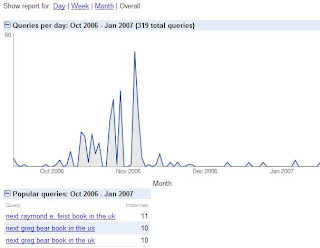 This isn't a new idea, people considered the possibility soon after Google Earth was launched, but last week a PhD grapevine rumour and Google's possible purchase of an in-game advertising company have renewed speculation.
This isn't a new idea, people considered the possibility soon after Google Earth was launched, but last week a PhD grapevine rumour and Google's possible purchase of an in-game advertising company have renewed speculation.How does Niniane fit into this? Ever since I read about Googler Niniane Wang's top secret social application space project for Google I've wondered what it could be. Google already has Orkut -- and it's not been a resounding success, but it seems unlikely that a new Orkut style project could be regarded as 'the best project at Google'.
Plus Niniane's background is in Windows programming, specifically real-world simulators. Her project has a c++ client and a Java server (like Google Earth). Before working at Google she was a team leader on Microsoft's Flight Simulator, and has submitted papers to SIGGRAPH for virtual world innovations like dynamic weather generation. At Google she won a founder's award for her work on the Windows application project Google Desktop. Who better to conceive of and head up Google Virtual Worlds?
Whether it's Niniane's team or not, Google does already have the tools to make virtual worlds that put Second Life to shame:
- Sketchup. People complain endlessly of the difficulty of using Second Life's in-game modelling tools. Sketchup is awesome and will let people construct all kinds of in game homes and artifacts quickly, easily, and for free.
- Google Earth. Google already has an increasingly detailed 3D world based on Google Earth submissions, why not let people explore it with avatars? It also proves they have the technology to present a virtual world.
- Checkout. Ready made in-game commerce system.
- Advertising. The in-game advertising company they've possibly just purchased gives them an excellent way to monetise a virtual world without charging players for every creation they build or use.
- *Many* global servers. Google already has a global network of high powered servers, perfect for ensuring everyone in Googleworld has a high speed, low latency experience.
Whether this is pure wishful thinking or the future direction of online social sites remains to be seen, but Niniane's project has been in deep cover for over a year, maybe in 2007 we'll get to see what they've been busy working on!
Update: To clarify, Niniane's resume changed since the last time I read it. Details for her secret social project previously included the following entries (since removed):
* Led a team of engineers through technical design and implementation of client (C++) and server (Java).
* Convinced artists, PM, UI designer, and engineers around the company to join the team or contribute 20% time.
The following blog entries from earlier confirm the previous wording:
- Google Operating System (The Brilliant Niniane Wang)
- Search Engine Lowdown

 I think this is the first time Google have announced
I think this is the first time Google have announced 

